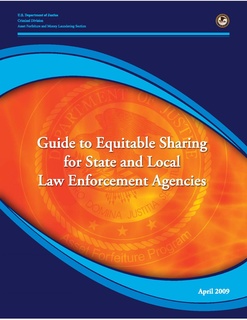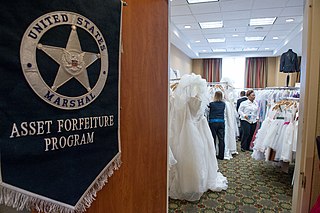Related Research Articles

Estelline is a town located in Hall County, Texas, United States. The population in 2010 was 145. The population was estimated at 141 in 2013. In 2012, Estelline was ranked #1 in a National Motorists Association listing of its "Worst Speed Trap Cities" in North America. Estelline often refers to itself as the "Town of Estelline", with a "Town Hall" and a "Town Council", rather than the customary "city" label. However, under Texas law, all incorporated municipalities are considered to be cities.

The disability rights movement is a global social movement that seeks to secure equal opportunities and equal rights for all people with disabilities.

The Institute for Justice (IJ) is a libertarian non-profit public interest law firm in the United States. It has litigated eight cases before the United States Supreme Court dealing with eminent domain, interstate commerce, public financing for elections, school vouchers, tax credits for private school tuition, civil asset forfeiture, and residency requirements for liquor license. The organization was founded in 1990. As of June 2016, it employed a staff of 95 in Arlington, Virginia and seven offices across the United States. Its 2016 budget was $20 million.
Confiscation is a legal form of seizure by a government or other public authority. The word is also used, popularly, of spoliation under legal forms, or of any seizure of property as punishment or in enforcement of the law.

The Drug Policy Alliance (DPA) is a New York City–based non-profit organization that seeks to advance policies that “reduce the harms of both drug use and drug prohibition, and to promote the sovereignty of individuals over their minds and bodies” The organization prioritizes reducing the role of criminalization in drug policy, advocating for the legal regulation of marijuana, and promoting health-centered drug policies. DPA has been led by executive director Kassandra Frederique since September 2020.

In rem jurisdiction is a legal term describing the power a court may exercise over property or a "status" against a person over whom the court does not have in personam jurisdiction. Jurisdiction in rem assumes the property or status is the primary object of the action, rather than personal liabilities not necessarily associated with the property.
An amercement is a financial penalty in English law, common during the Middle Ages, imposed either by the court or by peers. The noun "amercement" lately derives from the verb to amerce, thus: the king amerces his subject, who offended some law. The term is of Anglo-Norman origin, and literally means "being at the mercy of": a-merce-ment.

Asset forfeiture or asset seizure is a form of confiscation of assets by the authorities. In the United States, it is a type of criminal-justice financial obligation. It typically applies to the alleged proceeds or instruments of crime. This applies, but is not limited, to terrorist activities, drug-related crimes, and other criminal and even civil offenses. Some jurisdictions specifically use the term "confiscation" instead of forfeiture. The alleged purpose of asset forfeiture is to disrupt criminal activity by confiscating assets that potentially could have been beneficial to the individual or organization.
Current issues concerning human rights in Albania include domestic violence, isolated cases of torture, and police brutality, the general condition of prisons, human and sex trafficking and LGBT rights.
Donald P. Scott was a 61-year-old man who lived on a ranch in a remote part of Ventura County, California, in the Santa Monica Mountains, who was fatally shot during a police raid on October 2, 1992. The officers were attempting to serve a warrant to search his ranch for marijuana. When the officers forcibly entered his home, Scott emerged from a bedroom waving a firearm over his head and was then shot while lowering his gun as he was ordered to do by police. No marijuana plants or other evidence of drug sales were found on the property.
Scott G. Bullock is an American lawyer who focuses on property rights issues such as eminent domain and civil forfeiture. He has been President and General Counsel at the Institute for Justice since 2016, a nonprofit libertarian public interest law firm. He represented Susette Kelo in Kelo v. City of New London, an eminent domain case decided by the Supreme Court in 2005. Bullock was a senior attorney before becoming the president of the institute and directed many cases on state and federal level. In 1994 he represented the institute in a forum on C-SPAN.

The Fifth Amendment to the United States Constitution addresses criminal procedure and other aspects of the Constitution. It was ratified, along with nine other articles, in 1791 as part of the Bill of Rights. The Fifth Amendment applies to every level of the government, including the federal, state, and local levels, in regard to a US citizen or resident of the US. The Supreme Court furthered the protections of this amendment through the Due Process Clause of the Fourteenth Amendment.

International asset recovery is any effort by governments to repatriate the proceeds of corruption hidden in foreign jurisdictions. Such assets may include monies in bank accounts, real estate, vehicles, arts and artifacts, and precious metals. As defined under the United Nations Convention against Corruption, asset recovery refers to recovering the proceeds of corruption, rather than broader terms such as asset confiscation or asset forfeiture which refer to recovering the proceeds or instrumentalities of crime in general.

Equitable sharing refers to a United States program in which the proceeds of liquidated seized assets from asset forfeiture are shared between state and federal law enforcement authorities. The Comprehensive Crime Control Act of 1984 set up the arrangement in which state and local police can share the seizures with federal agents. The law allows state and local law enforcement to retain up to 80% of the proceeds from seizures made in collaboration with federal agencies and from seized assets turned over to the federal government that the federal government then elects to adopt.

Civil forfeiture in the United States, also called civil asset forfeiture or civil judicial forfeiture, is a process in which law enforcement officers take assets from people who are suspected of involvement with crime or illegal activity without necessarily charging the owners with wrongdoing. While civil procedure, as opposed to criminal procedure, generally involves a dispute between two private citizens, civil forfeiture involves a dispute between law enforcement and property such as a pile of cash or a house or a boat, such that the thing is suspected of being involved in a crime. To get back the seized property, owners must prove it was not involved in criminal activity. Sometimes it can mean a threat to seize property as well as the act of seizure itself. Civil forfeiture is not considered to be an example of a criminal justice financial obligation.
Mahmoud Reza Banki is an Iranian-American scientist and management consultant. Born in Tehran, Iran, Banki immigrated to the US to attend college and became a naturalized US citizen in the 1990s. In January 2010, Banki was arrested and charged with violating US sanctions against Iran by the United States Attorney's office in New York City. Ultimately Banki won his case on appeal, and it was permanently closed in July 2012. Banki spoke about his case at a TED Talk in 2014, presenting a case for change in criminal justice. As of 2015 a documentary film about the case was being made. In The Moth podcast released January 2017, Banki spoke to the personal toll of the ordeal. Banki has also spoken before various audiences for the cause of improving the criminal justice system. On January 20, 2021, Banki received a full and unconditional pardon from the President of the United States.
The cannabis policy of the Reagan administration involved affirmation of the War on Drugs, government funded anti-cannabis media campaigns, expanded funding for law enforcement, involvement of the U.S. military in interdiction and eradication, reduction in emphasis in drug treatment, and creation of new Federal powers to test employees and seize cannabis-related assets.
Timbs v. Indiana, 586 U.S. ___ (2019), was a United States Supreme Court case in which the Court dealt with the applicability of the excessive fines clause of the Constitution's Eighth Amendment to state and local governments in the context of asset forfeiture.
Nebraska v. One 1970 2-Door Sedan Rambler (Gremlin) 191 Neb. 462, 215 N.W.2d 849 (1974) is a Nebraska Supreme Court civil forfeiture case. It was brought by the American state of Nebraska to seize a Rambler Gremlin on the sole grounds it was transporting illegal marijuana. The owner appealed against the forfeiture decision on the grounds of a claimed lack of due process. The court ruled 4–2 and sustained the confiscation as lawful.
Task Force KleptoCapture is a United States Department of Justice unit established in March 2022 with the goal of enforcing sanctions on Russian oligarchs in response to the Russian invasion of Ukraine.
References
- ↑ JOHN ENDERS (ASSOCIATED PRESS) (April 18, 1993). "Forfeiture Law Casts a Shadow on Presumption of Innocence : Legal system: Government uses the statute to seize money and property believed to be linked to narcotics trafficking. But critics say it short-circuits the Constitution". Los Angeles Times . Retrieved October 11, 2014.
....When Carl and Mary Shelden sold their home and agreed to carry a $160,000 note, they had no idea they were about to be trapped in a government web that would cost them almost everything they owned...
- 1 2 Bob Egelko, July 13, 2012, San Francisco Chronicle , Harborside may find answers in L.A. case, ... Retrieved October 14, 2014, Brenda Grantland, a Mill Valley attorney and president of an organization called Forfeiture Endangers American Rights...."
- ↑ "FEAR: Why FEAR civil asset forfeiture?". www.fear.org.
- ↑ "F.E.A.R. Lawyer Referral Directory - Brenda Grantland". fear.org. Mill Valley, California. Archived from the original on 2011-09-28. Retrieved 2011-06-20.